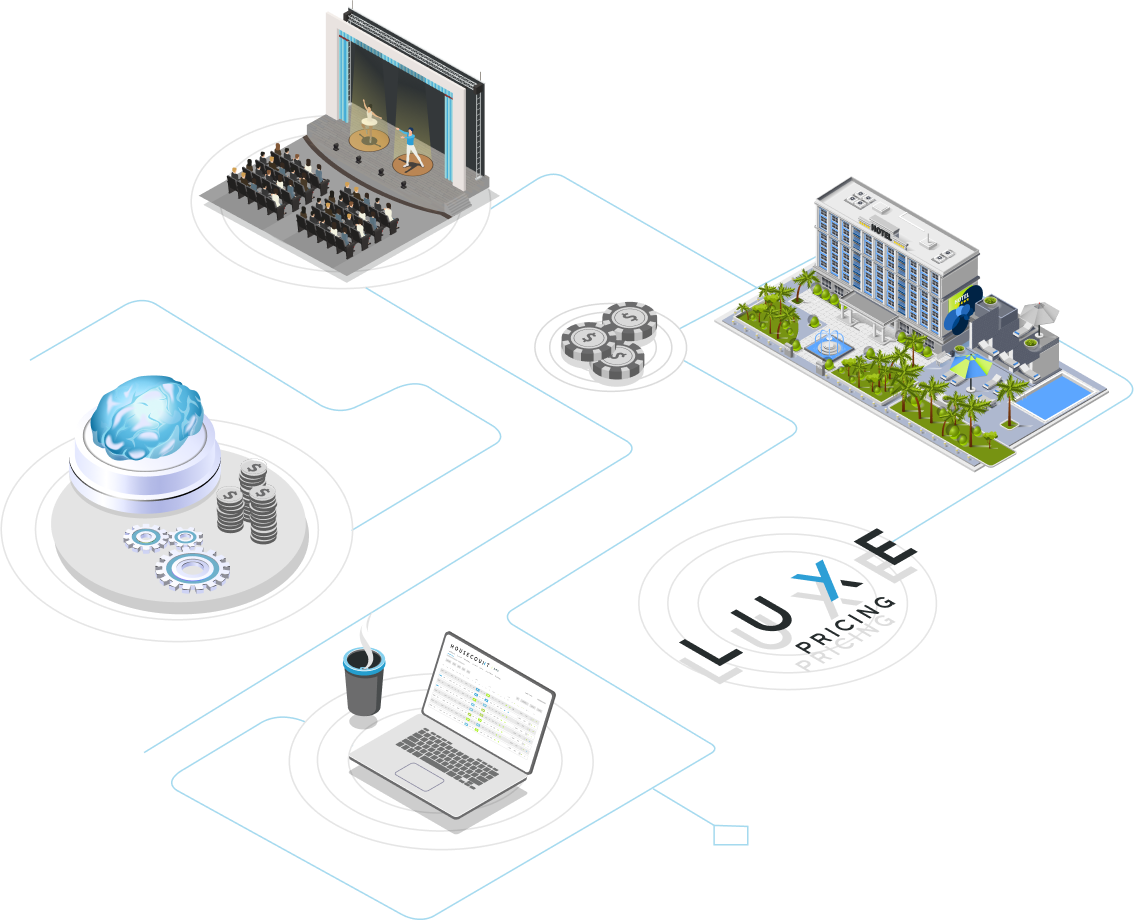What is Revpar, How Does It Work, and Why Does It Matter?
Revenue available per room (RevPAR) is an essential metric used in the hospitality industry to measure a hotel's...

Table of Contents
Utilizing an efficient and robust revenue management system is one thing. Hiring an effective, patient, and determined hotel revenue manager is another. Revenue managers serve as the hub of the hospitality industry.
Hotel revenue managers speed up the process of commission negotiation across distribution channels, room rate management, tech system implementation, and more. These individuals serve as essential assets to your hotel or resort to assist your business in boosting financial performance.
However, despite the prevalence of hotels utilizing revenue managers, several hoteliers are still confused about their responsibilities and how they can effectively hire for this role to optimize their hotel’s revenue and profitability. This article talks about the dynamic roles of a hotel revenue manager and valuable tips on how you can become one or hire one effectively. Plus we’ll also discuss the differences between a corporate vs. an on-property revenue manager.
Hotel revenue managers are hospitality professionals with the primary role of managing and handling leading pricing strategies. These strategies can help your hotel gain maximum profitability. Hotel revenue managers also help place your business in a better market position.
Balance is always the key to a good hotel revenue management strategy. Hotel revenue managers strive to facilitate pricing strategies that can help you meet your commercial goals while working with operations, sales, and marketing.
It’s imperative for revenue managers to be closely working with your hotel’s various stakeholders to establish strategic and data-driven decisions using the following factors:
Additionally, revenue managers must be knowledgeable in hotel yield management, especially in identifying a property’s restrictions and availability.
Revenue managers must also utilize a methodological approach when dealing with pricing strategies. With the help of several innovative tools like a property management system, RMs help your hotels attract more guests, boosting your hotel’s competence and revenue through inventory optimization.
At the end of the day, a good revenue manager helps improve overall hospitality management, keeping the business running effectively with maximum profitability in mind.
Revenue managers have several key tasks they must successfully carry out for your hotel. These include the following:
The primary task is to accomplish long-term forecasting responsibilities to determine various demand levels and analyze the necessary information for trend identification.
This involves continuous monitoring of your hotel’s performance across various distribution channels, including:
Keeping track of these channels allow hotels to determine where they are getting most of their investment from. At the same time, a revenue manager can keep data across all distribution channels updated.
Hotel revenue managers are also crucial in department collaborations in your establishments. They provide overarching strategies to ensure unity among your team members.
It’s also commonly part of a revenue manager’s job description to give creative ideas on alternative revenue sources or ways to improve your financial outcomes.
Writing reports is also a critical task for a hotel revenue manager. They must be comfortable and responsible in creating reports to present them in an organized manner to senior figures and hotel stakeholders.
Other minor tasks that also fit a hotel revenue manager’s job description include:
Through these tasks, your hotel’s management department will find it easier to predict recurring events and understand sudden demands that can happen in the future.
From upsell opportunities to accurate price management, Luxe Pricing is here to maximize your revenue.

We know we’ve mentioned it, but revenue managers are critical to a hotel’s success. Typically, these professionals graduate from a hospitality management program, but it isn’t always necessary. Sometimes, hospitality revenue managers start out in an entry-level position at a hotel and work their way up over the years. Both types of managers can be equally competent in their jobs. they should also monitor and understand your hotel’s departments to keep up with the latest trends.
Hotel revenue managers can effectively boost a hotel’s profit margins when everything is done right. To help you, here are valuable tips to become a successful hotel revenue manager.
|
Valuable Tip |
Primary Benefit |
|
Focus on value |
Your hotel’s value should be clear to your guests and your team members |
|
Proper Distribution Channel Analysis |
Maintains consistency across all distribution channels where your rooms are listed |
|
Budgeting and Forecasting |
Anticipate guests’ demands to keep up with the latest market trends |
|
Market Segment Review |
Gives you an overview of the types of guests who frequent your hotel |
|
Pace Report Analysis |
Gives revenue managers reports that can effectively create better pricing strategies |
|
Competitive Market Share |
Allows hotels to forecast their current market shares and compare them with their competitors |
|
Pricing Analysis and Adjustments |
Ideal to differentiate and setting prices depending on low and peak seasons |
|
Target Automation in Suitable Places |
Utilize innovative tools to allow convenience and seamless operations |
|
Same Day and Advanced Inventory Check |
Promote inventory effectiveness to keep things in order |
|
Master Changing Costs |
Regularly track your hotel’s key performance indicators |
The hospitality industry belongs to a sector is price-sensitive, which means perceived and precise values are essential. As a hotel revenue manager, it’s your duty to know their differences:
Focusing on value does not mean you must always think about the competition. Instead, you must be able to convince your guests that there is value in booking your hotel. There are several ways you can accomplish this, such as the following:
As hotel revenue managers, you must go out of your way to establish creative value-added extras to elevate your guests’ booking and staying experience. This increases the chance of your customers remembering their stay and making a rebooking. At the same time, this can help you gain a better image, reputation, and recommendations.
As a hotel revenue manager, you must ensure that all your property listings are valuable across all distribution channels. This is an essential revenue management strategy that helps your business grow.
Establishing a proper distribution channel analysis also means deciding which channels work best for your hotel. Consider the following factors:
The first thing for a proper channel analysis is determining what your hotel’s business objectives are. Remember that distribution channels exist to increase your visibility online. This makes it easier for ideal guests to reach your listings and book instantly. Also important is ensuring your target metrics and sales objectives align with your distribution strategy.
This means finding your target audience. Your hotel entices certain demographics with specific types of customers, so you must consider who they are when you are choosing and analyzing potential distribution channels.
A proper analysis should also entail a proper comparison of key metrics. Establishing how you will measure the goals and objectives of your hotel will make it easier to determine how well certain distribution channels are performing.
Consider that a channel that can give you your desired visibility may have slimmer profit margins or higher costs. But when you employ the right strategy, you can get the right mix of three main aspects:
Always remember that distribution channel analysis is dynamic. As a revenue manager, you must continuously monitor and test new channels and optimize your current strategies. This ensures the channels align with your core principles to deliver the most profitable results.
Forecasting is also critical for a revenue manager. You must generate accurate forecasting reports so hoteliers are well-informed of the establishment’s projected needs, costs, and expected revenues. Employing proper forecasting strategies also facilitates proper mapping. This allows hotels to leverage information about where guests’ demands originate.
Mapping will enable you to spot past and current trends in a client’s demand concerning customer demographics, including place of origin and age. This strategy also uncovers other helpful information, including the average customer spend and the reservation type.
Utilizing information obtained from mapping allows you to establish better budgeting strategies for your hotel. A hotel revenue manager's critical duty is to maintain a smooth flow of profitability and income for your business.
It’s also the responsibility of the hotel revenue manager to be in-depth with utilizing market segment reviews. These reports should be outstanding and easily understood by your hotel’s departments. When market segment reviews are kept in a single place, it’s easier to pull up records as needed.
Creating accurate market segment reviews includes the following data you must acquire from your guests:
Your market segment reviews must also include your guests’ preferred booking channels. This becomes useful in identifying what channels to prioritize to gain more bookings and increase your profitability.
Additionally, accurate market segment reviews can enable you to establish and maximize your business’s rate level utilization. As a hotel revenue manager, you can maximize the hotel’s profits through rate level utilization by employing the following tactics:
Pace reports help with effective pricing strategies. These metrics allow your duty as a revenue manager to determine whether reservations are enough or the prices need to undergo adjustments.
As revenue managers, it’s not enough that you utilize these reports. You must also keep your eyes and focus on the daily, primarily because of the changing market trends in the industry.
Revenue managers must master four primary pace reports: room type, week parts, and trend analysis. The below table breaks down these four kinds of pace reports in greater detail.
|
Type of Report |
Description |
|
Room Type |
Pace reports regarding room types is valuable in the dynamic hospitality industry. These reports reveal the booking patterns of your guests that may need additional research. Let’s say your hotel’s monthly occupancy rate is the same as last year. You must also consider different room mixes. If occupancies are more common in the lower category rooms, consider the following signs:
Knowing these details allows revenue managers like you to plan strategically and pivot your action plans. Room-type pacing reports also prevent you from making unsatisfactory pricing decisions you will regret. Room-type reports also allow you to look at the bigger picture and understand the real story behind evolving trends in your hotel. Another instance is the increase in total room occupancy compared to the previous year. During this circumstance, not considering pacing reports will give you an initial reaction to raise room prices because of greater demand. But if you make decisions with the room type pace report in mind, it’s easier to reveal that the demand for the lower-priced rooms possibly causes higher occupancy. This makes you understand that raising the bar rate will not yield desirable results. |
|
Week Parts |
Analyzing pace reports through week parts lets you determine whether your business is busiest during weekdays or weekends. Doing this helps achieve equilibrium across all the days when you’re operating. Moreover, this pacing report detects the need for immediate pricing action. |
|
Recurring Events |
A pace report of recurring events is ideal for hotels that base their annual revenue on event days. This type of report analysis can better show evolutions in the trend, allowing you to manage pricing tactics more efficiently. You can also isolate recurring events, including the Christmas holidays, Thanksgiving, Spring break, and more. Because these days will give your hotel the highest impact, you can leverage these periods by increasing your room prices and earning more. |
|
Trend Analysis |
Trend analysis involves revenue managers looking closely at current trends in the hospitality industry. These trends can include the following:
These trends can primarily affect a guest’s booking behavior. It’s part of your duty as a revenue manager to monitor these trends to utilize your hotel’s occupancy properly. Moreover, reports on trend analysis can help hotels predict the following:
|

Benchmarking your market share is also a valuable tip for becoming a successful revenue manager. This report gives hoteliers detailed overviews of your sales strategy, allowing better revenue allocation per room. It’s in comparison to a defined competitor set.
Benchmarking enables hotels to compute their market share based on RevPAR, average room rate, and occupancy. These critical factors can evaluate the relationship between your hotel and your competitors. Plus, they give you three resulting KPIs:
Daily benchmarking also allows you to gauge your hotel’s effectiveness in business strategies. It also allows a comparison of your segmentation and pricing strategies versus other defined competitor hotels.
Like forecasting, pricing analysis is critical in becoming an outstanding hotel revenue manager. Adjusting your room prices is connected with proper forecasting methods. When you accurately predict high and low activity days in your hotel, making price adjustments will be easier.
After making necessary adjustments, creating pricing reports are also important. You must collate and organize daily, weekly, monthly, and yearly reports for optimal historical data-keeping. Moreover, these records can also be your basis when forecasting.
As a hotel revenue manager, you will get swamped with several pieces of information, graphs, trends, and other records for the good of your hotel. At the same time, you must maintain strong communication skills with various departments in the hotel.
Hotel revenue managers have many responsibilities, and dealing with more manual tasks can increase the potential to make more mistakes. This is also why you must rely on innovative digital tools to promote efficiency and save more time.
Automation is the name of the game with hotel revenue management. The right hotel technologies can help streamline processes, create reports, and analyze data faster and in the most simplified way. Moreover, this frees up more mental bandwidth for projects that need more attention and hands-on effort.
Inventory checks are also important. This drives better revenue because it allows you to sell the right room to the right guest at the most suitable price. The essential reason revenue managers must perform daily and advanced inventory checks are to prevent double-booking, over-booking, and under-booking.
Overbooking means saying no to guests who have already booked a room at your establishment. This can enrage your customers because who wants to be turned away? Another disadvantage of turning them away is the bad reviews and negative comments they might leave on your website and social media platforms.
Double-booking is just as detrimental as overbooking. From the point of view of revenue management, this can result in guests being dissatisfied with your business, affecting your image and reputation.
On the other hand, under-booking happens when some rooms are left unoccupied even after listing them across various distribution channels. This serves as a loss of the opportunity to maximize your hotel revenue.
A hotel’s operating costs have changed over the years because of increasing labor costs and high inflation rates. This also means profit margins and your hotel’s ADR and RevPAR are constantly evolving.
As a hotel revenue manager, you must expect a continuous increase in operating costs to adjust room prices accordingly. You must master the true value of success while considering inflation rates, evolving market trends, and sudden increases in supply and labor costs.
Revenue managers can either be on-property or corporate. They don’t work like most general manager positions, where they always have to be on-site. Both contain advantages and disadvantages you must know before choosing how you want to work with your hotel.
|
On-Property Revenue Manager |
Corporate Revenue Manager |
|
Witnesses first-hand knowledge and experiences about a hotel’s activities and trends |
Responsible for managing groups of hotel properties |
|
Best works with a single hotel to prevent missed opportunities to grow revenue and boost performance |
The need to talk to several people over the phone because of multiple properties |
|
Build stronger relationships with the hotel’s departments and team leaders |
Relationships with various team leaders are more professional |
|
More time to deal with reports and analysis since they only work with one hotel |
Must think of suitable strategies for each hotel he works with |
On-property revenue managers are individuals who work face-to-face with a single hotel. Their daily responsibilities include visiting the site and physically monitoring significant trends, reports, and analyses.
An on-property revenue manager can experience first-hand knowledge of the hotel’s market and activities. This makes it easier for him to study and establish suitable practices that will work best for the hotel.
Moreover, because the revenue manager works on-site, they can interact with the hotel’s team leaders across all departments. This is a good advantage because it will be easier to accomplish tasks that require collaboration and joined analysis.
Interacting with various team leaders allows on-site revenue managers to identify challenges and potential risks affecting a hotel’s performance and revenue.

On the other hand, corporate revenue managers oversee groups of hotel properties. This means you might see them making multiple calls to different hotels daily. Corporate revenue managers effectively work with various hotels thanks to newly invented tech tools.
Corporate revenue managers must be keen and disciplined in monitoring trends and reports to avoid distractions that can negatively impact their responsibilities. Depending on forecasting and the competition, there is a constant need to plan and adjust pricing strategies.
Moreover, a corporate revenue manager must be creative and innovative enough to identify the best strategies that will work for each hotel he managers.
Revenue management experienced a shift in its needs and practices during and after the pandemic. Several uncertain depend patterns arose, leading to negligible historical data. Guests have also changed their responsibilities and priorities when looking for a hotel to book.
As hotel revenue managers, you must understand that the pandemic is simply an example of the principle that change is constant. The world will continuously evolve, and you must be resilient and flexible enough to deal with these changes and use them to shift your manager duties.
With the decline in occupancy levels, hiring hotel revenue managers during the pandemic to facilitate better commercial decision-making became even more important. These individuals should be well-rounded in taking care of the hotel’s revenue while it’s undergoing a recovery process.
The pandemic also paved the way for revenue managers to rely heavily on newly invested tech tools and innovation. Technology can assist them in developing strategies based on forecasting and analyzing trends in the market.
The pandemic also shifted hotels to look for remote revenue managers. This gave them the advantage of seeing the industry in the bigger picture because remote revenue managers consider the competition.
What makes this also advantageous is that remote revenue managers consider it more convenient to work with a hotel even when they are not on-site. Together with innovative tech tools, they can handle their duties responsibly, even from afar.
Even when you have an exceptional hotel revenue manager, it’s useless when you don’t have the right tools. You need a robust software solution to drive your hotel's most revenue and profitability.
This is where HouseCount RMS can change everything. It’s a revenue management system that can help revenue managers establish data-driven pricing strategies, ideal for all hotels. HouseCount RMS examines each hotel’s values, goals, and needs and sets up tactics and strategies according to its analysis and reports.
Moreover, HouseCount RMS is cloud-based and features real-time dynamic pricing. This enables your hotel to remain on track with sudden market changes and necessary price adjustments.
A hotel revenue manager with the right professional skills is needed to grow your revenue and keep the hotel’s performance on track. But you must also ensure that they utilize the best software solution and tech systems to stay updated with the current market trends and changing guest demands.
Through proper forecasting, budgeting, and allocating necessary price adjustments, hotel revenue managers can drive success to your business. This is regardless of whether your manager works on-property or remotely.
Utilizing a software solution like HouseCount RMS gives you real-time pricing trends for revenue managers to develop the most applicable strategies to boost your revenue. Schedule a demo to learn more about how it works and how it can support your hotel revenue managers.
From upsell opportunities to accurate price management, Luxe Pricing is here to maximize your revenue.





Get Hooked! Sign Up to get the latest catch sent to your inbox.
Revenue available per room (RevPAR) is an essential metric used in the hospitality industry to measure a hotel's...
Regardless of your hotel’s size, the main business goal is to provide a great guest experience. Being able to...
Maximizing your hotel’s revenue in today’s Inclement economy is essential. With the speed of digital optimization,...